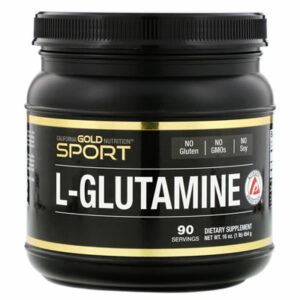L-glutamine is an important amino acid with many functions in human body. In recent years, it has been commonly used in cancer radiotherapy and chemotherapy, post-surgery, and fitness exercises.
The following will introduce L-glutamine benefits and side effects?
Table of Contents
- What is L-glutamine?
- How to eat L-glutamine (dose)?
- What are the benefits of L-glutamine?
- 1. Improve mucositis induced by chemotherapy or radiotherapy
- 2. Improve peripheral neuropathy caused by chemotherapy
- 3. Improve diarrhea caused by chemotherapy
- 4. Improve radiation enteritis caused by radiotherapy
- 5. Beneficial for critically ill patients
- 6. Beneficial fitness or athlete performance
- Are there any side effects of L-glutamine?
- Safety precautions
- L-glutamine food source?
- Where to buy the most recommended L-glutamine health food?
What is L-glutamine?
L-glutamine is the highest content of amino acids in the human body, accounting for about 60% of the muscle free amino acid pool and 20% of the plasma free amino acid pool.
L-glutamine is mainly involved in various physiological processes, including energy and nucleotide formation, redox balance, acid-base balance, glucose metabolism, gene expression, cytokines, hormone production, muscle protein metabolism, and cell proliferation.
Since most tissues can synthesize L-glutamine, it is not an essential amino acid.
However, it is hypothesized that under catabolism and stress conditions, L-glutamine is a necessary amino acid. Once the demand exceeds its own synthesis capacity, the plasma and intracellular L-glutamine concentration will decrease, leading to physiological dysfunction. For example, during high-intensity exercise and severe illness
How to eat L-glutamine (dose)?
The dosage used in the study ranges from about 5 grams per day to high doses of about 45 grams per day within 6 weeks.
If you decide to take L-glutamine supplements, it is best to start with a conservative dose of about 3 grams per day.
Reduce oral mucositis caused by chemotherapy: 4 grams per day, starting from the first chemotherapy, until discharged or the symptoms disappear.
What are the benefits of L-glutamine?
1. Improve mucositis induced by chemotherapy or radiotherapy
The term mucositis was first introduced in 1980 to describe oral mucosal inflammation caused by radiotherapy (occurring in 80% of patients), chemotherapy (40-80% of patients) and bone marrow transplantation (more than 75% of patients).
At present, oral mucositis is considered to be the most serious non-hematological complication in cancer treatment. It initially appears as erythema of the oral mucosa, and then often develops into erosions and ulcers, causing damage to oral function, such as speaking, swallowing saliva, or eating difficulties.
The consequences of mucositis may be mild and require little intervention, but they can also be serious, such as causing hypovolemia, electrolyte abnormalities, and malnutrition, and even leading to death.
A Systematic Review (including 15 studies) pointed out that oral L-glutamine can significantly reduce the incidence of grade 2, grade 3, or grade 4 mucositides and the duration of mucositis after receiving chemotherapy or radiotherapy. Time of onset, severity, and reduction in weight loss (but no significant difference in nausea, vomiting, dry mouth, and anorexia).
Another literature analysis (Meta-Analysis, including 5 clinical studies, a total of 234 head and neck cancer patients) pointed out that oral L-glutamine can reduce the risk and severity of severe oral mucositis caused by radiotherapy or chemotherapy.
*Conclusion: Taking L-glutamine several days before chemotherapy or radiotherapy is positive for the prevention and improvement of mucositis, but further prospective and large-scale trials are still needed to support these findings.
2. Improve peripheral neuropathy caused by chemotherapy
Chemotherapy-induced peripheral neuropathy is a common side effect of specific chemotherapy drugs (especially platinum, taxanes, vinca alkaloids, thalidomide, bortezomib).
The main symptoms are abnormal sensory function, pain, or loss of motor control, which sometimes leads to a reduction or cessation of chemotherapy dose, which limits the effectiveness of cancer treatment.
The prevalence of peripheral neuropathy in the first month of chemotherapy is 68.1%, the prevalence in 3 months is 60.0%, and the prevalence in 6 months is 30.0%.
A comprehensive analysis of the literature (including 4 studies) pointed out that although oral L-glutamine can reduce the pain of peripheral neuropathy caused by chemotherapy, it has no significant help for indicators such as severity, numbness, and muscle weakness.
*Conclusion: For the symptoms of peripheral neuropathy caused by chemotherapy, oral L-glutamine fails to bring significant improvement and is limited by the small sample size, and more large studies are still needed to corroborate.
3. Improve diarrhea caused by chemotherapy
Diarrhea is a common side effect of chemotherapy, which often occurs in subjects who are treated with 5-fluorouracil and irinotecan.
According to reports, the incidence of diarrhea during chemotherapy is as high as 82%, and as many as one-third of patients have severe (grade 3 or 4) diarrhea.
Chemotherapy-induced diarrhea severely interferes with anti-cancer treatment, resulting in treatment changes in approximately 60% of patients, 22% of patients with reduced doses, 28% of patients with delayed doses, and 15% of patients completely discontinued treatment.
Persistent and severe chemotherapy-related diarrhea is often associated with malnutrition and dehydration, leading to concomitant weight loss (cachexia), fatigue, kidney failure, infection, hemorrhoids, and perianal skin rupture.
A meta-analysis of literature (including 8 randomized controlled trials, 298 participants) pointed out that for diarrhea caused by chemotherapy, L-glutamine can reduce the duration of diarrhea (especially oral administration is the most effective, intravenous injection is invalid ), but its severity cannot be improved.
*Conclusion: Oral L-glutamine can improve the duration of diarrhea caused by chemotherapy, but more large and accurately designed randomized controlled trials are still needed to confirm.
4. Improve radiation enteritis caused by radiotherapy
Radiation therapy is the main method of various malignant oncology treatments. It is usually used for the gastrointestinal tract, urinary tract, and gynecological cancer. Although it is more targeted to the lesion, it still has side effects on normal organs or tissues.
Radiation enteritis (radiation enteritis) is used to define the small intestine damage caused by radiation therapy, which can lead to acute or chronic radiation enteritis, causing pain, bloating, nausea, fecal urgency, diarrhea, and rectal bleeding, which have a significant impact on the patient’s quality of life influences.
A meta-analysis of literature (including 13 randomized controlled trials, a total of 979 patients receiving pelvic or abdominal radiation therapy) pointed out that compared with the control group, the use of L-glutamine can reduce the incidence of radiation enteritis, improve the response rate, Improvement of symptoms (including tenesmus, abdominal cramps, stool blood loss), but the improvement was not statistically significant.
*Conclusion: For radiation enteritis caused by radiation therapy, oral L-glutamine failed to significantly improve the severity and symptoms, and was limited by the number of samples and related errors of the included studies, which still needs to be further verified.
5. Beneficial for critically ill patients
In most patients, critically ill occurs before physiological deterioration, characterized by strong metabolic changes, leading to malnutrition and impaired immune function.
Malnutrition, including the consumption of essential micronutrients and weight loss, is common in severe patients, with 20% to 40% of patients showing signs of protein and energy malnutrition.
Severe patients often suffer from spontaneous food intake due to anorexia, gastrointestinal symptoms, depression, anxiety, and other medical and surgical factors.
A literature review and meta-analysis (including 11 randomized controlled trials, a total of 1079 adult critically ill patients) pointed out that intestinal L-glutamine supplementation can only reduce the length of hospital stay, and it can reduce hospital mortality, infection complications, and severe illness. There was no obvious help on the day of stay in the intensive care unit.
In addition, the same analysis also pointed out that in a small number of burn patients, intestinal L-glutamine supplementation can significantly reduce hospital mortality and hospital stay.
*Conclusion: For critically ill patients, intestinal L-glutamine supplementation does not bring significant clinical benefits in addition to reducing the length of hospital stay, and is limited by the small sample size. Larger randomized trials are still needed to corroborate.
6. Beneficial fitness or athlete performance
With the rapid development of sports nutrition science and practice, nutrition is increasingly regarded as an important part of maintaining optimal sports performance.
Proper nutrition can promote muscle regeneration, glycogen recovery, reduce fatigue, support physical and immune health, which helps athletes prepare for the next competition or training course for the entire season.
A literature review and meta-analysis pointed out that for sports training, supplementing with L-glutamine is only slightly helpful for reducing body weight, and other measurement indicators have no significant improvement, including immune function (white blood cells, lymph Cell and neutrophil counts), maximum oxygen uptake (Vo2max), body composition (fat mass and lean body mass), plasma glucose creatine kinase, growth hormone levels.
*Conclusion: Under normal circumstances, supplementing L-glutamine for fitness or exercise-related training does not significantly help the immune system, aerobic performance, and body composition, but it is limited to a small number of samples and more large-scale trials are still needed to further verify.
Are there any side effects of L-glutamine?
Since L-glutamine is an amino acid, it is naturally produced in the human body, and it exists in many foods, so proper supplementation is not harmful to the human body.
However, the possible side effects that have been reported after supplementation are: constipation, abdominal pain, nausea, headache, cough, pain in extremities, shortness of breath, rash, chest tightness, wheezing, rapid heartbeat, chills, sudden decrease in urine output, etc…
The safe value of the upper limit of no side effects observed in the study is about 14g per day, and although the dose is higher than this amount, it is well-tolerated, but there is not enough evidence to show that long-term high-dose supplementation is not harmful, and there is not enough evidence to assume There is a hazard.
Safety Precautions
Do not use during lactation of pregnant women (because the relevant safety is unknown).
Do not use if you have liver cirrhosis or hepatic encephalopathy (may cause symptoms to worsen).
People who have been sensitive to MSG/sodium glutamate should not use it (commonly known as Chinese restaurant syndrome), because the body will convert glutamate to sodium glutamate, thus promoting similar sensitive symptoms.
Do not use in patients with epilepsy or mania (may increase the incidence).
May interfere with the absorption and transportation of other amino acids.
Do not use antiepileptic drugs, because glutamic acid will affect the chemical substances in the brain, which will affect the effectiveness of the drug. The names of related drugs are phenobarbital, primidone, valproic acid, gabapentin, carbamazepine, phenytoin.
Do not use lactulose (lactulose, a drug for treating constipation and improving hepatic encephalopathy), which may affect the efficacy of the drug
L-glutamine food source?
L-glutamine is synthesized from glutamate or glutamate in the body. If the body cannot produce a sufficient amount, it needs to be ingested from the diet.
Almost any food containing protein will contain some glutamic acid, the only difference is the content.
Glutamic acid is mainly found in animal protein, such as beef, chicken, tuna, cheese, shrimp, dairy products, and vegetable protein sources, such as beans, spinach, cabbage, nuts, peanuts, and so on.
However, it is worth noting that animal protein is not as easy to digest as plant protein.
Where to buy the most recommended L-glutamine health food?
In recent years, food safety problems in various countries have exploded, and it is not healthy but black-hearted products that everyone spends on. Therefore, European and American products with relatively strict quality control have become popular products.
And iHerb.com is a large-scale medical cosmetics e-commerce company in the United States. It has a high satisfaction rate of 97% in the evaluation of Google customers. It provides global home delivery so that you can buy it without risking buying fakes through purchasing high-quality health products.

